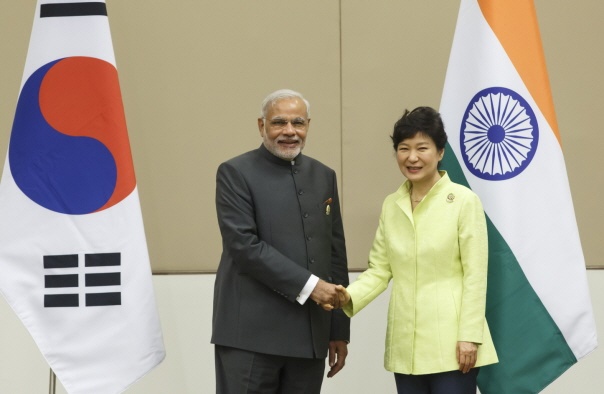The Peninsula
Are Korea - India Relations Set to Improve in 2015?

By Nicholas Hamisevicz
During the last week of December, India’s External Affairs Minister, Sushma Swaraj visited Korea to co-chair with her counterpart, Korean Foreign Minister Yun Byung-se, the 8th India-Korea Joint Commission meeting, while one month prior South Korean President Park Geun-hye was able to meet with Indian Prime Minister Narendra Modi for the first time since he was elected Prime Minister. These meetings were important to quickly connect the Park Geun-hye administration with the new leadership in India under Prime Minister Modi; moreover, these opportunities have helped the two countries take a fresh look at the lingering issues holding back relations. There are positive signs from these meetings and the likelihood of future meetings to suggest a sincere desire to work through these problems to enhance relations. If so, there is potential for a very solid year of Korea – India relations in 2015.
It is an exceedingly good sign for the relationship that high-level meetings are taking place and are likely scheduled for the future. It was significant for Park Geun-hye and Narendra Modi to meet bilaterally, even on the sidelines of a multilateral East Asia Summit meeting, to keep the momentum going on key issues that can drive the partnership forward as Prime Minister Modi is courted in his first year in office. With the high likelihood of increased India-Japan relations because of Prime Minister Modi’s relationship with Japanese Prime Minister Shinzo Abe, it would benefit Korea to capitalize on India’s attention to Japan and its ambition to “Act East”.
Despite these connections, India and Korea still have some major work to do on existing interactions. Noticeably absent from Minister Swaraj’s opening remarks at the Joint Commission meeting was POSCO. This investment is still being held up, and the company is still not allowed to fully build on the site as previously agreed due to a mire of state and local laws and rulings.
Korea and India also want to upgrade their Comprehensive Economic Partnership Agreement, but there are likely differences on which areas each country would like to enhance. After President Park met with Minister Swaraj, a statement from the Blue House suggested Seoul also wants to improve the Double Taxation Avoidance Agreement and the Civil Aviation Agreement between India and Korea. Additionally, the minesweeper deal has been terminated, so Korea will have to find another defense contract to help them break into the Indian defense procurement market. While Minister Swaraj pushed the Modi administration’s “Make in India” initiative, many of these high-profile economic interactions will need to be completed in order to demonstrate to other Korean companies that it is easier to do business in India than before.
The frequency and variety of high level meetings between Korea and India are creating positive dynamics for the two sides to earnestly address issues restraining relations. More high-level interaction often brings with it more engagement at the lower levels where the negotiations for these higher level meetings and the potential agreements takes place. This is a good sign and can help build a foundation for making 2015 an important year for Korea – India relations.
Nicholas Hamisevicz is the Director of Research and Academic Affairs for the Korea Economic Institute. The views represented here are his own.
Photo from the Blue House.
